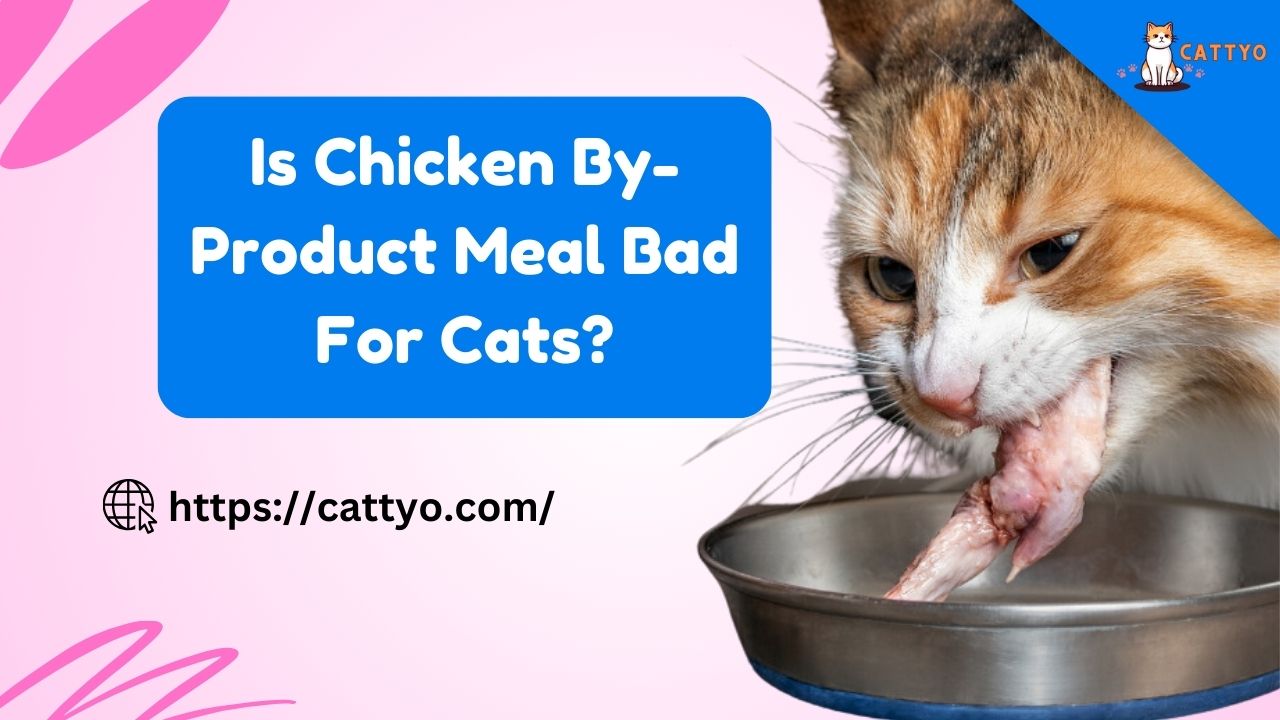Have you ever wondered what goes into your cat’s food? As pet owners, we all want to provide our feline friends with the best nutrition possible.
When you pick up a bag of commercial cat food, one of the most common ingredients you’ll find listed is “chicken by-product meal.” But what exactly does that mean, and should it raise a red flag for you?
Is chicken by-product meal bad for cats? Let’s explore this controversial ingredient, its potential benefits, and the concerns surrounding it, so you can make the best decision for your pet.
What Is Chicken By-Product Meal?
When we talk about chicken by-product meal, we’re not referring to the juicy chicken breast you might add to your salad.
Instead, chicken by-product meal is made from parts of the chicken that are not typically consumed by humans.
This includes the skin, bones, feathers, and internal organs. While these might sound unappetizing, they can be nutritious for cats when processed properly.
The process of creating chicken by-product meal involves rendering, which is a method of cooking down the chicken parts to separate fats and proteins.
The result is a concentrated, powdered form of protein that’s often used as a cost-effective ingredient in pet foods.
Chicken by-product meal is a high-protein, nutrient-dense ingredient that provides amino acids, vitamins, and minerals necessary for your cat’s health.
It’s important to note that chicken by-product meal is different from whole chicken meat.
While whole chicken meat refers to actual muscle tissue from the bird, chicken by-product meal includes a variety of other chicken components.
This difference in ingredients has led to mixed opinions among pet owners and experts.
Are Chicken By-Products Safe for Cats?
The safety of chicken by-product meal often comes into question because of the lower-quality ingredients it can contain, such as feathers and beaks.
However, when produced by reputable manufacturers, chicken by-product meal can be perfectly safe for cats. Here’s why:
- Nutrient Density: Chicken by-products contain essential nutrients like proteins, fats, amino acids, and minerals. Many of these nutrients are easily digestible for cats and can contribute to their overall health. For example, organs such as the liver are rich in vitamins A and B, which are important for your cat’s immune system and overall well-being.
- High-Quality Control: Not all chicken by-product meals are created equal. Responsible manufacturers ensure that the by-products used in their products are safe, thoroughly cleaned, and free from contaminants. By-products are typically sourced from animals that have passed strict veterinary inspections.
- Digestibility: Cats are obligate carnivores, meaning they require animal-based protein to thrive. Chicken by-product meal, when rendered properly, can be an easily digestible and effective source of this protein. However, some cats may struggle with certain by-products, particularly those that come from lower-quality sources.
So, is chicken by-product meal bad for cats? Not necessarily. It depends on the quality of the by-products used and how the meal is processed.
In high-quality commercial cat foods, by-product meals can provide essential nutrients in a form that’s easy for cats to digest.
The Pros of Chicken By-Product Meal
There are several benefits to using chicken by-product meal in cat food. While some pet owners might shy away from it, there are real advantages to this ingredient.
1. Affordable Protein Source
One of the main reasons chicken by-product meal is used in pet food is that it is a cost-effective way to add protein. Protein is essential for cats’ muscle development and energy. By using by-products, manufacturers can provide a nutrient-dense product at a lower price, which is especially helpful for people with multiple pets or those on a budget.
2. Nutrient Density
Chicken by-products are rich in protein, fats, and essential nutrients like amino acids and vitamins. These nutrients help maintain healthy skin, coat, and organ function in cats. For example, chicken organs (like the liver) are particularly high in vitamin A, which supports vision and immune health.
3. Palatability
Some cats prefer the taste of food that contains chicken by-product meal, as it often has a stronger, more appealing flavor than some other protein sources. If your cat is a picky eater, food containing by-products might be more attractive to them.
4. Sustainability
Using by-products in pet food can also be more environmentally friendly. By utilizing parts of the chicken that might otherwise go to waste, manufacturers can reduce food waste and make better use of the entire animal, supporting sustainability in the pet food industry.
The Cons of Chicken By-Product Meal
While there are advantages to using chicken by-product meal, there are also some potential downsides. Understanding these can help you make an informed choice when selecting cat food.
1. Quality Concerns
Not all by-products are of equal quality. Some lower-quality by-products, such as feathers, beaks, and other non-nutritive parts, may be included in the meal. These parts can provide limited nutritional value and may affect the overall quality of the pet food.
2. Digestibility
Not all cats can digest by-products as efficiently as others. Cats with sensitive stomachs or food allergies may experience digestive issues when consuming meals that contain by-products. In some cases, this could lead to vomiting, diarrhea, or general discomfort.
3. Potential Allergies and Sensitivities
Some cats may have allergies or sensitivities to certain animal proteins or by-products. If your cat has a known sensitivity to chicken or poultry, chicken by-product meal may trigger an allergic reaction, causing itching, swelling, or gastrointestinal distress.
4. Lack of Transparency
Some pet food labels list “chicken by-product meal” without specifying exactly what parts of the chicken are used. This lack of transparency can be concerning for pet owners who want to know exactly what they’re feeding their cats. It’s always a good idea to choose brands that are transparent about their ingredients and sourcing.
How to Choose the Best Cat Food
When choosing cat food, it’s important to look beyond individual ingredients like chicken by-product meal. Instead, focus on the overall nutritional profile and the quality of ingredients.
1. Read the Ingredients List
Always read the full ingredients list to understand what’s in your cat’s food. Look for whole meat sources, such as “chicken” or “turkey,” as the first ingredient, which is a sign of high-quality protein. If chicken by-product meal is listed, check the rest of the ingredients to see if they are also high quality.
2. Consult a Veterinarian
If you’re unsure about what’s best for your cat, consult your vet. They can recommend the right diet based on your cat’s age, health condition, and specific dietary needs.
3. Consider Whole Meat vs. By-Products
While by-products can be nutritionally valuable, some pet owners prefer foods that contain whole meats. Whole meats are more recognizable as “real” protein and may be a better choice if you want to avoid by-products entirely.
Alternatives to Chicken By-Product Meal
If you’re concerned about feeding your cat chicken by-product meal, there are plenty of alternatives available. Here are a few options:
1. Whole Meat Proteins
Look for cat food that lists real, whole meats such as chicken, turkey, or lamb as the first ingredient. These offer high-quality, easily digestible protein sources.
2. Grain-Free or Limited-Ingredient Diets
Some cats do better on grain-free or limited-ingredient diets, which avoid by-products altogether. These diets typically focus on a single animal protein and fewer fillers.
3. Raw or Homemade Diets
Some pet owners opt for raw or homemade meals for their cats, ensuring complete control over the ingredients. However, raw feeding requires careful planning and consultation with a vet to ensure a balanced diet.
FAQs
1. Is chicken by-product meal harmful to my cat’s health?
Chicken by-product meal is not harmful if it’s sourced from high-quality ingredients and processed properly. It can be a good source of protein and nutrients for your cat.
2. How can I tell if my cat is allergic to by-products?
Look for signs such as itching, vomiting, or diarrhea. If you notice these symptoms after feeding your cat food with by-product meal, consult your vet to determine if your cat has an allergy.
3. Can by-products be beneficial for senior cats?
Yes, chicken by-products can provide essential nutrients, such as protein and fats, which are beneficial for senior cats who need to maintain muscle mass and overall health.
4. What are the best alternatives to by-product meals in cat food?
High-quality whole meats, such as chicken or turkey, and grain-free diets are often considered better alternatives to by-products.
5. Is all chicken by-product meal the same quality?
No, the quality can vary depending on the manufacturer and the specific parts of the chicken used. Always choose reputable brands with high standards for ingredient quality.
Conclusion
So, is chicken by-product meal bad for cats? Not necessarily. When processed and sourced correctly, chicken by-product meal can be a nutritious and safe ingredient in your cat’s food.
However, as with any pet food ingredient, quality matters. Always do your research, read the label, and choose foods from trusted manufacturers.
At the end of the day, the best diet for your cat depends on their individual health needs.




